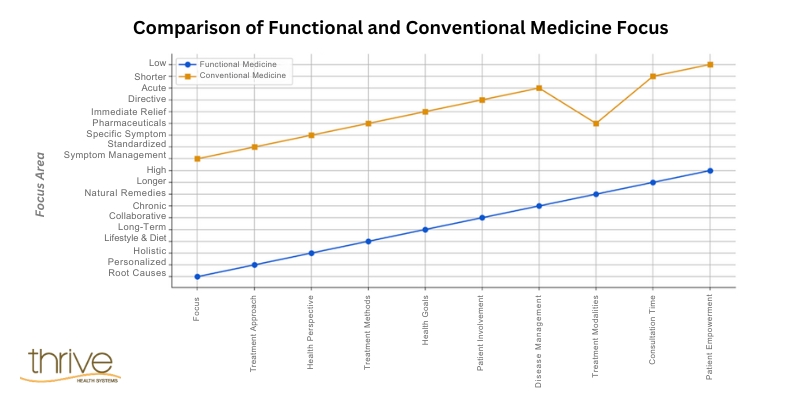
Functional Medicine for autoimmune disorders offers a transformative approach to autoimmune disorder treatment by targeting the underlying causes of disease rather than solely focusing on symptoms. Unlike conventional treatments, which often rely on medications to manage symptoms, Functional Medicine emphasizes a root cause treatment for autoimmune disorders. Through personalized medicine for autoimmune disorders, this approach considers each patient’s unique biochemistry, lifestyle, and environmental factors, offering a holistic autoimmune care model that is designed to support long-term wellness and resilience.
By addressing factors such as chronic inflammation, immune system dysfunction, and stress, Functional Medicine seeks to restore balance and prevent disease progression naturally.
The differences between Functional vs. Conventional Medicine are significant when it comes to managing autoimmune diseases. Functional practitioners employ a combination of lifestyle and diet for autoimmune health, inflammation reduction techniques, and integrative practices to achieve immune system balance and support healing from within. From dietary adjustments to stress management and targeted supplements, the Functional Medicine approach to autoimmune diseases empowers patients with tools for long-term autoimmune management.
This focus on personalized care and sustainable changes offers a pathway to treating autoimmune conditions naturally and encourages an integrative, patient-centered approach to healing.
Functional Medicine for Autoimmune Disorders: How It Differs from Conventional Treatments
Functional Medicine takes a unique, holistic approach to managing autoimmune disorders, focusing on root causes rather than just symptom relief. This approach is particularly effective in addressing the complexities of autoimmune disorder treatment, as it leverages personalized medicine and natural remedies to bring about long-term health improvements. Here are the top ten aspects that differentiate Functional Medicine for autoimmune disorders from conventional methods, covering each key element of this tailored approach:
1. Root Cause Treatment for Autoimmune Disorders
- Identifying underlying issues: Unlike conventional treatments that focus on symptoms, Functional Medicine investigates underlying causes, such as genetic, environmental, and lifestyle factors.
- Addressing chronic triggers: Chronic inflammation treatment is key, with Functional Medicine targeting inflammation sources to minimize autoimmune responses.
- Holistic assessment: Practitioners take a comprehensive view of each patient’s history, lifestyle, and stressors to develop a personalized strategy for long-term health.
2. Functional vs. Conventional Medicine
- Focus on prevention and reversal: In Functional Medicine for autoimmune disorders, the goal is to restore balance and prevent progression, while conventional medicine primarily aims at symptom management.
- Personalized over generalized care: Conventional treatments tend to offer standardized medications, whereas Functional Medicine is customized to each individual.
- Integrative approach: By combining integrative health practices, Functional Medicine looks beyond pharmaceuticals, using supplements, diet changes, and stress management for comprehensive care.
| Feature | Functional Medicine | Conventional Medicine |
|---|---|---|
| Focus | Root Causes | Symptom Management |
| Treatment Approach | Personalized | Standardized |
| Health Perspective | Holistic | Specific Symptom |
| Treatment Methods | Lifestyle & Diet | Pharmaceuticals |
| Health Goals | Long-Term | Immediate Relief |
| Patient Involvement | Collaborative | Directive |
| Disease Management | Chronic | Acute |
| Treatment Modalities | Natural Remedies | Pharmaceuticals |
| Consultation Time | Longer | Shorter |
| Patient Empowerment | High | Low |

3. Personalized Medicine for Autoimmune Disorders
- Tailored treatments: Each autoimmune disorder treatment is uniquely tailored to the patient’s genetic makeup, lifestyle, and environmental exposure.
- Biochemical individuality: Functional Medicine recognizes that each individual’s biochemistry is unique, impacting how autoimmune disorders manifest and progress.
- Ongoing adjustment: Treatment plans are adjusted based on ongoing feedback, making it an adaptable and patient-centered approach.
4. Holistic Autoimmune Care
- Mind-body connection: Functional Medicine emphasizes the importance of mental and emotional health in managing autoimmune disorders.
- Lifestyle and Diet for Autoimmune Health: Nutritional counseling and stress reduction are essential components of holistic autoimmune care.
- Comprehensive support: Beyond medical treatments, this approach includes support for lifestyle changes, such as exercise, sleep hygiene, and social health.
5. Immune System Balance
- Reducing overactivity: Functional Medicine for autoimmune disorders works to balance the immune system and prevent excessive immune responses.
- Supporting immune health: Treatments aim to fortify the immune system without overstimulation, fostering a healthy balance.
- Long-term immune support: Through lifestyle and diet for autoimmune health, patients build immunity resilience, which is crucial for preventing flare-ups.
6. Chronic Inflammation Treatment
- Addressing root causes of inflammation: Chronic inflammation often triggers autoimmune disorders, so inflammation reduction techniques are central to the Functional Medicine approach.
- Natural remedies for autoimmune disorders: Anti-inflammatory foods, supplements, and lifestyle modifications help reduce inflammation.
- Ongoing inflammation monitoring: Functional practitioners track inflammation markers to gauge treatment effectiveness and adjust as needed.
7. Lifestyle and Diet for Autoimmune Health
- Anti-inflammatory diet: Dietary changes form a major part of Functional Medicine for autoimmune disorders, focusing on nutrient-dense, anti-inflammatory foods.
- Detoxification and nutrient balance: Diet plans often emphasize detoxification and rebalancing essential nutrients.
- Customized dietary plans: Each patient’s dietary plan is based on their unique triggers and needs, helping to minimize autoimmune reactions.
8. Integrative Health for Autoimmune Disease
- Combining various therapies: Functional Medicine includes physical, mental, and lifestyle therapies for a more comprehensive approach.
- Mindfulness and stress reduction: Practitioners use mindfulness, meditation, and other techniques to manage stress, which can aggravate autoimmune conditions.
- Collaboration across specialties: Functional practitioners often collaborate with other health professionals to address all aspects of autoimmune disorder treatment.
9. Long-Term Autoimmune Management
- Sustaining health improvements: The Functional Medicine approach focuses on maintaining health gains long-term rather than providing temporary relief.
- Proactive adjustments: Treatment evolves with the patient’s progress and new health goals, making it sustainable.
- Monitoring and adapting: Continuous evaluation of symptoms and underlying causes allows Functional Medicine to adapt, ensuring patients maintain balance.
10. Treating Autoimmune Conditions Naturally
- Natural interventions: Functional Medicine for autoimmune disorders prioritizes natural remedies, such as herbal supplements, nutrient therapies, and lifestyle adjustments.
- Minimizing medication dependence: By reducing inflammation and restoring immune balance naturally, patients often rely less on medications.
- Supporting whole-body health: Natural treatments not only address autoimmune symptoms but also boost general wellness, resulting in a better overall quality of life.
Conclusion
Functional Medicine provides a comprehensive, individualized, and natural approach to autoimmune disorder treatment that sets it apart from conventional methods. By focusing on the root causes and emphasizing immune system balance, lifestyle, and dietary interventions, this approach fosters long-term autoimmune management and wellness. For individuals seeking a holistic, sustainable solution to managing autoimmune conditions, Functional Medicine offers a promising path forward, addressing the full scope of health factors that influence immune health.

